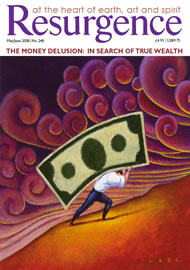IT IS SOMETIMES hard to be hopeful about the future of the planet. Seldom a week goes by without news of the problems facing the world. When we hear of the polar caps shrinking, devastating hurricanes in the Caribbean, droughts in sub-Saharan Africa, or even floods in middle England in the summer, there seems to be every reason to be more than a little fearful.
Other news can fill us with a tremendous amount of grief, sorrow and even anger – documentaries revealing the challenges faced by orphaned children growing up infected with HIV/AIDS, or news of death and destruction in war-torn regions of the world. The disturbing news is sometimes closer to home and perhaps all the more bewildering for it – children and teenagers shot in car parks or stabbed in tower block stairwells.
It is easy to get the feeling from the news that both the planet and society are heading towards some sort of collapse, and it seems that this is a feeling widely shared. Last year I managed to get a question into a Europe-wide survey that asked people whether they were hopeful about the future of the world. Over 46% weren’t hopeful, whereas only 27% felt optimistic (the other 27% sat on the fence). The survey covered over 30,000 people right across new and old Europe. Of these, the French appeared the most pessimistic (70% were not hopeful), the Danes appeared the most optimistic (though still only 43% were hopeful), and the British were pretty much in the middle (32% hopeful, 42% not). The data is startling. At face value, it means that most people in Europe think humankind is heading for dark times.
But does it have to be that way? Can we find a path towards a better future – a future where society is fairer and our ecological footprint is sustainable? If we could start to describe this vision of the future more clearly then perhaps people would actually want to make the changes needed to move towards it. Technically this is what psychologists call an ‘approach goal’ rather than an ‘avoidance goal’. All the research on dieting for example (don’t eat this, don’t eat that) shows that avoidance goals are simply not good strategies for achieving long-term sustainable change.
WHEN I TALK about a happier, fairer and lower-carbon future I quite deliberately put the word ‘happier’ first. Some people don’t seem to like this. In fact they don’t seem to like the concept of happiness itself, claiming that it is trivial, transient and intangible. But there is evidence that happiness is not only a vital element of a more socially and ecologically just future, but also the key to it.
I want to share with you my favourite insight from positive psychology. Consider for a moment the evolutionary purpose of emotions. Why do human beings have feelings at all? Clearly they must serve some purpose that aids our very survival as a species. The so-called negative emotions of anger and fear have been well understood for some time, and form the basis of the ‘fight or flight’ syndrome. If there is a dangerous predator close then it serves us to be frightened and run away or freeze (so as to look small and avoid detection), or to try to attack. But why do we feel happy? Until recently feeling happy was seen solely as a signal of good functioning. In other words it was interpreted as a message that ‘life is good’ and we should carry on with what we are doing.
Barbara Fredrickson’s theory of broaden-and-build offers a revolutionary new understanding. The first part of her theory is that positive emotions ‘broaden’ our repertoire of thoughts and actions; when experiencing positive emotions we pay more attention, are more flexible, playful, and open to relationships and are ultimately more creative in our responses to the immediate environment. The second part highlights the other benefits that flow from these thoughts and actions as they facilitate the ‘building’ of psychological and physical capacities; these include resilience, social skills, physical abilities, emotional intelligence and self-mastery. In other words it is the experience of happiness itself that helps us to build the skills that we will need to overcome future challenges.
Other research shows that people flourish in situations where they have a certain stability of relationships as well as the ability to delight in dynamic opportunities to challenge them. And, whilst many people have high levels of financial wealth in Western countries, the stability of our relationships is placed under severe strain as we work ever-longer hours in pursuit of ever-greater material wealth. But if we pursue happiness rather than wealth we can enhance ‘quality of life’ and build the capacity that will equip us to face future challenges and reduce our resource use.
IF WE WANT to create a future world that offers sustainable livelihoods for all, we will need flexible, resourceful and open people. These are precisely the kinds of skill that flow from happiness.
When I try to imagine these sustainable societies and communities, I think they are likely to share some common features as well having distinctive local characteristics. There will be no homogenous ‘one size fits all’, but an interdependent network of communities. The commonalities will include ecological justice and human wellbeing. The diversity will reflect local cultures, traditions and creativity as well as different local ecological conditions. The changes are quite likely to be profound, but they could also be profoundly enriching.
We clearly have a long journey to make if we are to create a sustainable future, and to start out on this journey we need to be sure that we are at least heading in the right direction. This need for a sense of direction demands new indicators to guide us. At a global level nef’s Happy Planet Index provides a new signpost for nations to assess their progress at living better but using a fairer share of the Earth’s available resources. We can mirror this process at a personal level by reflecting on the possibility that less might be more. Shedding the excess baggage of the materialistic life might be psychologically and spiritually liberating – enabling us to feel lighter and live more lightly.
That is my vision for the future: happier people and a happier planet. If we can start to communicate this vision more broadly and act on it, there are very real reasons to be hopeful.
For more information visit: www.happyplanetindex.org








